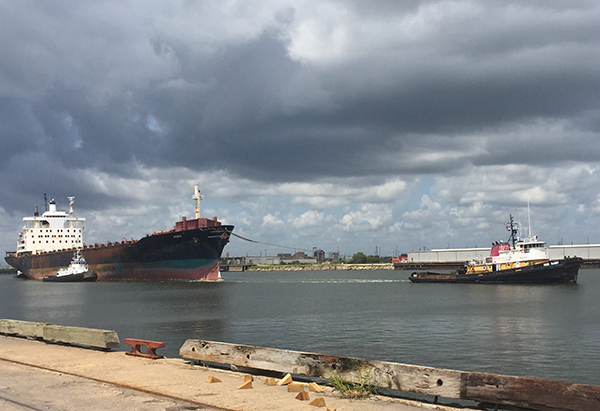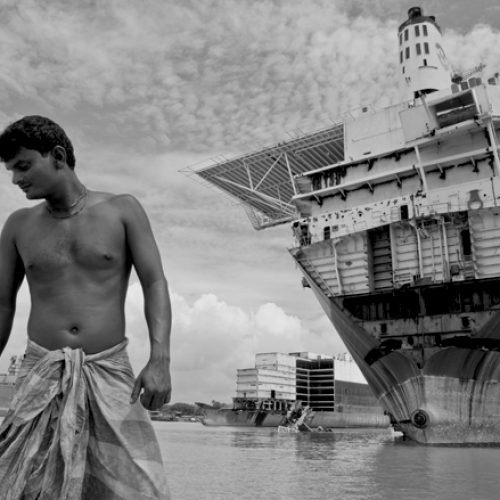Platform News – Dead U.S. Ship on Four-Month Tow Ends on Indian Beach
The HORIZON TRADER, a 42 year-old American built and operated container ship, was beached earlier this month at the notorious shipbreaking site of Alang, India, despite the last ship owner Matson, Inc. having sold it for recycling in the US.
The dead vessel contains hazardous materials, making its final voyage from the U.S. to India illegal waste trafficking under the Basel Convention, which controls the transboundary movements of hazardous wastes. The vessel likely contains polychlorinated biphenyls (PCBs), which also makes the sale an illegal export of PCBs from the US. According to environmental justice group Basel Action Network (BAN), responsibility not only falls on the former U.S. ship owner, but also on the five countries that failed to uphold their obligations to stop the renegade vessel along its four-month journey.
BAN photographed the HORIZON TRADER on 2 September 2015 as a U.S. tug named GAUNTLET (also known as MISS GAUNT) towed it out of the Port of Brownsville, Texas. BAN tracked the vessels along the four-month journey through Trinidad and Tobago, Namibia, and Mauritius before arriving in Indian waters on 30 December 2015.
While BAN notified authorities in each country prior to the vessels' arrival, and called on authorities to uphold their legal obligations under the Basel Convention, each country failed to intervene to halt the illegal transport and prevent it from being run aground in Alang. The HORIZON TRADER arrived in Alang, under the name D.V. ("dead vessel") TRADER and was beached on 8 January 2016.
Some have argued that the Basel Convention does not effectively control the export of hazardous end-of-life ships because it's difficult to determine when a ship actually becomes waste along its journey. However, in this case, the "dead" ship was defined as waste before it departed the U.S. The failing lies not with the law but rather with the countries that ignored their obligations under international law: Mauritius, Trinidad and Tobago, Namibia, and India, all of which are Parties to the Basel Convention.

The HORIZON TRADER first gained notoriety in September 2015, when All Star Metals, a U.S. ship recycler based in Brownsville, Texas, who was thought to have scrapped the vessel themselves at their ship recycling facility, resold the ship in 2015 for breaking in India without the knowledge or consent of Matson, Inc., the ship's former owner.
Matson sold the vessel to All Star with the expectation that All Star would recycle it at their facility, but BAN's investigation discovered otherwise. Matson has since assured BAN that in the future they would vigilantly uphold a policy of forbidding the export of their old ships to South Asian beaches.

The hazardous waste management costs of the TRADER would have been significant in the U.S., perhaps even higher than the value of scrap metals contained in the vessel, especially with commodity prices so low. Hazardous waste management costs are not an important consideration at the beach breaking facilities in India. Hazardous waste streams, PCBs in particular, aren't treated or disposed of with the necessary care, hence a cost savings at the expense of environmental and human health. Asbestos-containing materials can even be resold for further use.
BAN and the NGO Shipbreaking Platform call on the Government of India to refloat the vessel and repatriate the ship to the U.S. to uphold their obligations under the Basel Convention.
They also call on the United States to disallow export to developing countries without a thorough PCB study conducted by the government at the cost of the exporter.


Horizon Trader being towed out of Brownsville, September 2, 2015 to India. Copyright BAN, 2015
Related news

Platform publishes South Asia Quarterly Update #17
There were a total of 113 ships broken in the third quarter of 2018. Of these, 79 ships were sold to the beaches of South Asia for… Read More

Press Release – Two workers killed at Gadani shipbreaking yards
NGOs join trade unions in calling for enforcement of occupational health and safety standards.
... Read More
Platform publishes South Asia Quarterly Update #14
There were a total of 227 ships broken in the third quarter of 2017. Of these, 124 ships ended up on beaches in South Asia for dirty… Read More

Platform News – Worker killed in yard breaking German-owned container ship “Viktoria Wulff”
On 4 December, worker Shah Jahan was killed on the spot at Arefin shipbreaking yard in Chittagong, Bangladesh, where German container ship “Viktoria Wulff” (IMO 9252101) is… Read More

Press Release – Dutch prosecutors press criminal charges against Seatrade
CORRECTION Brussels, 15 February 2018 – Following discussions with the Dutch Public Prosecutor, cash buyer GMS was not confirmed to be the end-buyer of the… Read More

Platform News – ECSA’s Alang report turns a blind eye on problems of beaching method
The European Community Shipowners’ Association’s (ECSA) has published a report on their visit to the Alang shipbreaking yards in India last April. The NGO Shipbreaking Platform criticises… Read More

Press Release – Worker dies at Kabir Steel’s shipbreaking yard in Bangladesh
Kabir Steel and Evergreen linked to worker’s death in Bangladesh.
... Read More
Press Release – Norwegian Central Bank excludes companies from government Pension Fund Global because of their beaching practices
The Norwegian Central Bank announced today its decision to exclude ship owners Evergreen Marine Corporation, Precious Shipping, Korea Line Corporation and Thorensen Thai Agencies from the… Read More
